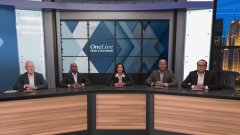
Potential Approaches to Treatment Switching in HR+/HER2- mBC
Experts share how they approach management of patients with disease progression on first-line endocrine therapy, with a focus on ESR1 mutation testing and identifying who might be suitable for treatment with the oral SERD elacestrant.
Episodes in this series

Transcript:
Komal Jhaveri, MD, FACP: Switching over from our first-line metastatic setting where we’ve definitely now established that we use CDK4/6 inhibitors and novel SERDs [selective estrogen receptor disruptors] might be a good endocrine partner of choice in the future based on these trials. When patients progress in the first-line metastatic setting and you have to think about what would you offer them next, what kind of factors or characteristics do you keep in mind when you’re making those choices?
Timothy Pluard, MD: [With] progression on first-line therapy, we start to think, what are the driver mutations? Is there an ESR1 [mutation] that has emerged during the first-line therapy, PI3 kinase inhibitors? Do they have a PIK3CA mutation that could be targeted? There’s the population that is 6 months or less on CDK4/6 inhibitors in the first line, and that’s a group of patients we know do very poorly on second-line endocrine therapy. So, it’s even more imperative to try to identify a potentially targetable mutation in those patients.
I think we’ve gotten away from just single-agent endocrine therapy, although now we have elacestrant, which could be a potential single-agent SERD that targets ESR1 mutations. So, I think as we start to get these new novel SERDs, the SERMs [selective estrogen receptor modulators], and the other anti-estrogens that may be more effective against ESR1, I think we’ll be able to use those and then start combining them again with CDK4/6 inhibitors, perhaps in the second line.
Komal Jhaveri, MD, FACP: Dr Bardia was the one who led the phase 3 EMERALD trial [
Aditya Bardia, MD, MPH: A good question. In general, I tend to follow evidence, and you know, based on the FDA label, elacestrant should be used in the second-line-plus setting for a patient who has detectable ESR1 mutation. So that’s where I would consider this drug. If you look at the EMERALD results and look at the progression-free survival, you see that in both arms there was an initial drop in the curves and then separation, which is consistent across all the studies that have been done in the second-line setting with endocrine monotherapy, because there’s a subset of patients who do not have ER [estrogen receptor]-driven tumors or ER-dependent tumors. In that setting, single-agent monotherapy with any endocrine agent is not going to work. The next question is, can we identify that? Ideally it should be some genomic factor and maybe in the future we’ll have some genomic predictor. We looked at clinical pathological features in terms of prior duration of CDK4/6, and it does appear that prior duration of CDK4/6 is a surrogate marker for endocrine sensitivity. Like any other surrogate markers, it’s not perfect, but at least [it] gives us more insight in terms of a population that might derive longer benefit with elacestrant. For example, patients who are on CDK4/6 inhibitor for at least 12 months, the median PFS [progression-free survival] with elacestrant was about 8 months as compared to about 2 months with standard therapy. So, maybe that’s another factor to consider in clinic when using elacestrant. In terms of what I’m excited about, I’m excited about combinations as we were discussing combining elacestrant with a CDK4/6 inhibitor. Hopefully, we’ll have better outcomes than [with] monotherapy.
Komal Jhaveri, MD, FACP: I think there are ongoing trials with elacestrant. The ELEVATE trial [NCT05563220] is evaluating multiple combinations.
Transcript edited for clarity.
Clinicians referring a patient to MSK can do so by visiting msk.org/refer, emailing referapatient@mskcc.org, or by calling 833-315-2722.







































